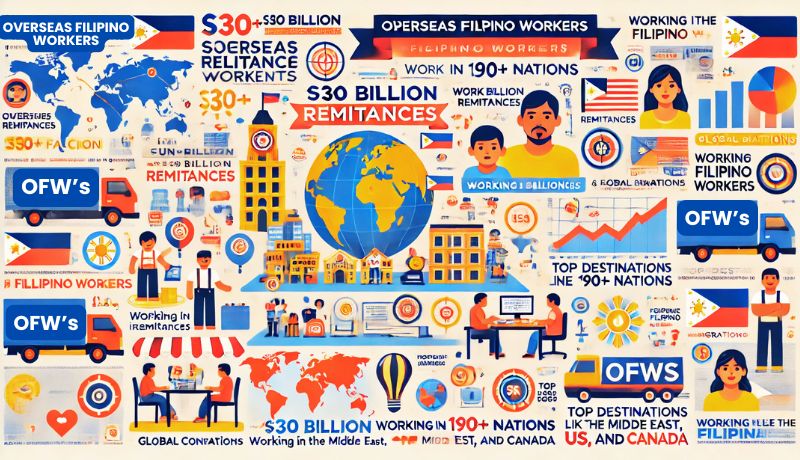
Updated: February 2025
Did you know that between April and September 2016, approximately 2.2 million Filipinos were working overseas?
This figure, based on the 2016 Survey on Overseas Filipinos (SOF) conducted by the Philippine Statistics Authority, continues to grow as thousands of Filipinos seek opportunities abroad each year.
But have you ever wondered why so many Filipinos choose to leave their homeland, families, and comfort zones to work overseas? What drives them to make such a life-changing decision?
For decades, millions of Filipinos have sought employment abroad in pursuit of a better life.
In this article, I’ll explore the top reasons behind this growing trend.
1. Limited Job Opportunities and High Unemployment in the Philippines
According to a Social Weather Stations (SWS) survey, as of March 2011, over 11.3 million Filipinos were unemployed. This alarming number is partly due to the oversaturation of graduates in certain professions that no longer offer ample job openings.

Take nursing, for example—one of the most popular courses among Filipino students. Every year, the Philippines produces approximately 200,000 nursing graduates, yet only 2,500 positions are available locally. As a result, many nurses are encouraged to work abroad where demand is higher and salaries are more competitive.
Fresh graduates often find it particularly difficult to land a job without prior experience. This paradox—needing experience to get hired but struggling to gain experience without employment—forces many to seek opportunities overseas where training and career growth are more accessible.
2. Higher Income and Better Salaries
For many Filipinos, the promise of financial stability is the primary motivation to work abroad. It’s a widely held belief that “the grass is greener on the other side.”
Wages in the Philippines are significantly lower compared to what Filipinos can earn for the same job abroad. A nurse, teacher, engineer, or accountant can earn two to five times more overseas than they would in the Philippines.
Some professionals even take on unrelated jobs, such as domestic work or clerical positions, simply because the pay is still considerably higher than local salaries.
With higher earnings, overseas Filipino workers (OFWs) can provide a better life for their families, ensuring their children’s education, medical care, and a more comfortable lifestyle.
3. The Influence of Social Trends and Peer Pressure
It has become almost a norm for Filipinos to aspire to work abroad. Many families have at least one member working overseas, and the financial benefits they bring back home often influence others to follow suit.
Seeing relatives and friends achieve financial success abroad encourages others to pursue the same path. Almost every family I know in our place has someone working overseas and sending financial support back home.
Even those with stable jobs in the Philippines sometimes resign to try their luck overseas, believing they should not be left behind.
4. Opportunities to Travel and Explore the World
Filipinos are naturally adventurous and eager to experience new cultures. According to a recent study, 47% of Filipinos expressed a desire to go abroad simply for the experience of traveling.
Working overseas provides an opportunity to explore new places, meet people from different backgrounds, and immerse oneself in diverse cultures. For many, the chance to see the world is just as enticing as the financial benefits.

Personally, my first trip abroad opened doors for me to visit several countries. It was an eye-opening experience that not only broadened my perspective but also enriched my life in ways I never expected.
5. Career Growth and Professional Development
In today’s competitive world, having international work experience gives professionals an edge. Employers value candidates with global exposure, believing they bring valuable insights and adaptability to diverse work environments.
Many Filipino professionals pursue careers abroad to gain specialized training, certifications, and a broader skill set that will benefit them in the long run.
Even established professionals, such as doctors and lawyers, sometimes take additional courses to qualify for overseas jobs, understanding that the global job market offers greater opportunities for career advancement.
6. Better Work-Life Balance
Many Filipinos seek employment abroad in search of a healthier work-life balance.
Some developed countries implement strict labor laws ensuring reasonable work hours, paid leaves, and other employee benefits that contribute to a better quality of life.
In contrast, the work culture in the Philippines can often involve long hours, minimal benefits, and high-stress environments.
7. Improved Healthcare and Social Benefits
Several countries offer better healthcare systems and social welfare benefits than the Philippines.
In nations such as Canada, Australia, and European countries, workers are entitled to government-subsidized healthcare, pension plans, and unemployment benefits. These perks make working abroad even more appealing to Filipinos seeking long-term stability.
A former colleague of mine, a nurse, decided to move to Canada primarily to secure better healthcare benefits for her aging parents. She wanted to ensure that they had access to quality medical care without the financial burden often associated with healthcare in the Philippines.

This is a common motivation among Filipinos who seek employment abroad—not just for their own well-being, but also to provide a better quality of life for their loved ones.
Several countries offer better healthcare systems and social welfare benefits than the Philippines.
In nations such as Canada, Australia, and European countries, workers are entitled to government-subsidized healthcare, pension plans, and unemployment benefits. These perks make working abroad even more appealing to Filipinos seeking long-term stability.
8. Political and Economic Instability in the Philippines
Over the years, political instability, corruption, and economic fluctuations have made it challenging for many Filipinos to secure a stable future in their homeland.
By moving abroad, they can escape the uncertainties of a volatile economy and find more predictable career paths with structured growth opportunities.
My sister-in-law, who now resides in the US, has shared that she grew tired of the political climate in the Philippines. The constant turmoil, inefficiency, and corruption were among the reasons she chose to seek a better, more stable life abroad.
9. Family Migration and Residency Opportunities
Some Filipinos take overseas jobs as a steppingstone to permanent residency or citizenship in another country. Many nations, such as Canada and Australia, offer immigration programs that prioritize skilled workers.
By initially working abroad, Filipinos can later bring their families and establish a new life in a more stable environment.
Fun Facts About OFWs and Filipino Migration
💡 The Philippines is one of the world’s top labor-exporting countries, with millions of Filipinos working in over 190 nations.
💡 Overseas remittances from OFWs contribute significantly to the Philippine economy, amounting to over $30 billion annually.
💡 The most popular destinations for OFWs include the Middle East, the United States, Canada, Australia, and European countries.
💡 Some OFWs, after years of working abroad, choose to return home and start their own businesses, using their overseas earnings as capital.

Are you an OFW planning to return to the Philippines but feeling uncertain about your next steps? Starting a business from home could be your key to a stable and fulfilling future.
With Wealthy Affiliate, you’ll gain access to all the tools, training, and support you need to build a successful online business. Whether you’re interested in blogging, affiliate marketing, or simply exploring new digital opportunities, this platform is designed to help you succeed—even if you have no prior experience.
Take charge of your future today and discover how you can turn your time and skills into a profitable business right from the comfort of your home. Sign Up for Free Here!
Final Thoughts
As someone who has worked overseas for 17 years, I feel both blessed and grateful for the opportunities I have had.
However, working abroad is not without its challenges. The loneliness of being away from family, high costs of living, and workplace discrimination are realities many OFWs face.
Interestingly, many long-term OFWs find it difficult to return home permanently. The lifestyle and work culture they’ve adapted to abroad become an integral part of their lives, making reintegration into the Philippines challenging.
If you’re an OFW, what motivated you to seek employment abroad? Do you have any regrets, or do you feel it was the best decision you ever made? I’d love to hear your thoughts in the comments below!

I’m a child of Filipinos (expats) who left the Philippines to work overseas. I’m not too sure how my parents felt, but I know they miss the Philippines a lot. Most recently, my mother just got back from the Philippines because of my cousin’s wedding. Every time she goes back, she and her siblings always have lengthy reunions and their own side-trips. But for some strange reason though, my parents never decided to go back and for us (their kids) to live there. Instead, we’re in another country now.
In terms of feelings with regards to having to leave a country we called ‘home’ for a long time, and then leaving – I can relate to that. There’s a particular country that I lived in for over 20 years. This is where my parents were expats. I really miss that country, but I’ve learned to move on. It wasn’t easy and of course I get very excited when I get to catch up with friends from that country.
Personally – I actually do want to move to another country. I haven’t done it because I’m not sure how and because I have my two beautiful children to think about. I’ve already started a life where I currently am, so there are several things I need to consider. Why do I want to move? Well – for other opportunities and to be different / unique! Not so much that the ‘grass is greener on the other side’, I just want to try it out. 🙂
Anyway, Gluck with everything that you do. 🙂
—
Marco
Hi Marco,
It’s always hard leaving the country that has been home to you for so many years. It’s even harder if you’re leaving because you have to and not because you want to. But as you said, we need to accept it and move on, otherwise we’ll end up being miserable.
One thing about Filipinos is that they can easily adapt and adjust to new environments, people and culture. Yes, it maybe difficult at first because of homesickness but give it some time and they’ll soon feel so at home and comfortable.
Thanks for sharing your own experience.
It’s a sad commentary when a Nation of People want to leave their home country to make a decent living. I am starting to understand why they have to resort to this now.
We on the other hand are doing the opposite! We have left the United States in order to live off our Pension. We can’t afford to live there anymore with the high costs involved.
Hello Clyde,
It is really sad that Filipinos need to leave their homeland in order to earn more money to support their families. On the other hand, working abroad opens many doors for career opportunities.
Today, almost every Filipino family has at least one member working overseas. If Americans are leaving their country because of the high cost of living, Filipinos would love to migrate to America to in order live the American dream.
Every Filipino has his/her own reasons for wanting to work abroad. Most of them want to provide for their families a better life but for me I had no plans of working overseas. I was just pressured by my loving mother to experience life outside the country. I did not really like it at first because I was already happy with my job and I did not want to leave my boyfriend behind.
But after 13 years of working abroad, I realized that my mother was right after all. That while I’m young I should explore all possible opportunities so I did. I do not regret listening to my mother because working abroad enabled me to provide financial stability not only for myself but for my family as well. If achieving that means being away from them most of the time that’s the sacrifice I’m willing to make.
I just wish that Filipinos do not have to seek employment far from their families because life abroad is not that easy. On the brighter side, working abroad does not only improve your financial status but it will also broaden your perspective in life.
Hi Janette, thanks for weighing in.
I can totally relate with you. Working abroad and earning a higher salary does enable us to provide a better life for our family and loved ones. After all, isn’t that what we all want?
I was not pressured by my mother to follow her abroad (yes, I’m a second generation OFW) but it was my own decision because I wanted to be with her. She’s been away from us for so long that I made it my goal to be with her, in the event that I wouldn’t land a job right away after graduation. So that was actually my reason for wanting to work abroad, to be with my mom. But after becoming comfortable in a foreign land, I began to enjoy being an OFW.
It is indeed a huge sacrifice for Filipino overseas workers to be away from their families but I think this is one of the reasons the word “sacrifice” was invented, he he! I wish too that Filipinos do not have to go abroad to earn more money and to have better career opportunities but I can’t imagine any country without Filipinos. Yes, we need their money but I believe they need our services more.
Cheers to us, the modern heroes of our homeland!